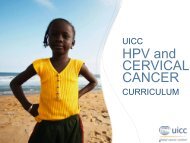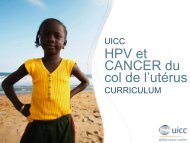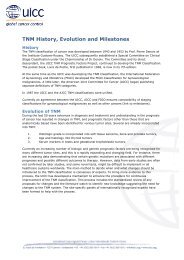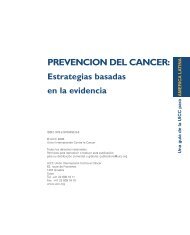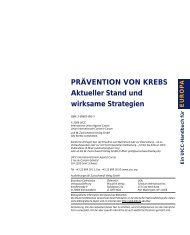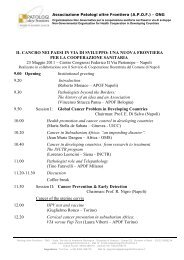Annual Report 05 - International Union Against Cancer
Annual Report 05 - International Union Against Cancer
Annual Report 05 - International Union Against Cancer
Create successful ePaper yourself
Turn your PDF publications into a flip-book with our unique Google optimized e-Paper software.
Connecting, mobilizing, supporting<br />
The UICC World <strong>Cancer</strong><br />
Declaration 2008<br />
2008<br />
Declaration <strong>Cancer</strong><br />
The World <strong>Cancer</strong> Declaration was developed by the UICC, adopted by the World <strong>Cancer</strong> Summit, and<br />
endorsed by the World <strong>Cancer</strong> Congress. It takes an optimistic approach to tackling the cancer crisis, setting<br />
World<br />
out 11 targets and 16 priority actions for concerted action to reverse current trends.<br />
The targets include significant drops in global tobacco consumption, obesity and alcohol intake; universal<br />
vaccination programmes for hepatitis B and human papilloma virus to prevent liver and cervical cancer;<br />
UICC<br />
dramatic reductions in the emigration of health workers with specialist cancer training; universal availability<br />
of effective pain medication; and the dispelling of myths and misconceptions about the disease. The<br />
“ This is an outstanding document,”<br />
Dr Margaret Chan,<br />
director-general of the<br />
World Health Organization, said at<br />
the opening plenary of the congress.<br />
Recent trends in public health make<br />
the international community receptive<br />
to its arguments and responsive<br />
to its call to action, she suggested.<br />
First, the time is right to place cancer<br />
control on the development<br />
agenda – the first priority action set<br />
out in the declaration. “Diseases like<br />
cancer are a leading cause of so-called<br />
catastrophic health expenditure. This<br />
is especially true in low- and middleincome<br />
countries, where most people<br />
rely on out-of-pocket payments<br />
for health care. WHO estimates that<br />
catastrophic payments for health care<br />
push an estimated 100 million people<br />
below the poverty line each year. For<br />
cancer, out-of-pocket payment is a<br />
double-edged sword. It discourages<br />
people from seeking treatment early,<br />
when the chances of cure are greatest.<br />
And it deepens household and<br />
community poverty.”<br />
Second, capacity building: the declaration<br />
sets out specific capacity<br />
needs for cancer control, especially in<br />
low- and middle-income countries.<br />
“In just the past few years, the international<br />
community has come face to<br />
face with the consequences of<br />
5



